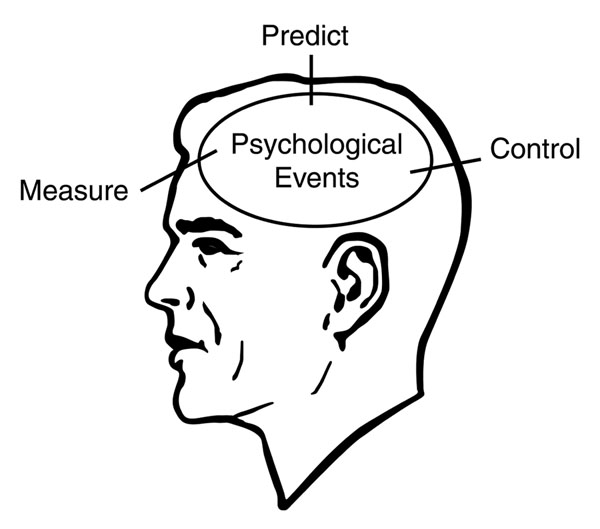Copyright © 2007-2018 Russ Dewey
Two Powers of Science
We have pointed out pitfalls in observational and experimental methods, but when these forms of research are done correction, their virtues are great. Observational and experimental research give us two distinct powers: prediction and control. Early psychologists from James to Watson all endorsed that as the goal of psychology: prediction and control of behavior.
What general goal was endorsed by psychologists from James to Watson?

A macho scientific head
Some people do not like this emphasis on control. The idea of controlling behavior or controlling nature implies nature is hostile and unruly, so it must be subdued by masterful humans. This assumption has been criticized as (a) distinctively Western, and (b) excessively macho.
Smith (1992) pointed out "the control of phenomena as an explicit aim of science is of relatively recent origin... For centuries, the aim of science was taken to be the understanding of natural phenomena."
Substituting the goal of understanding in place of control, we can say observational and experimental methods amplify two distinct types of mental ability: (1) prediction of future events, and (2) understanding of natural systems.
Prediction Science can give us advance warning of phenomena. Through observational research, we can detect correlations and make predictions.
Understanding Science can help us gain knowledge about systems so we understand how they operate. Having analyzed components of a system and how they work together, we can interact more skillfully with the system. We can nurture it or repair it, such as ecologists who repair a damaged ecosystem, or mechanics who fix a car.
Prediction and understanding resemble the human powers of intuition and analysis. They may be different words for the same processes.
Intuition involves sensitivity to patterns. Not just humans but many animal species pick up correlations and use them to make predictions. Classical conditioning, the simplest and oldest form of learning, is all about this: noticing correlations and using them to make anticipatory responses.
Intuition is often expressed as hunches or predictions. To the extent these predictions are accurate, they must be based on the brain's ability to sense correlations.
We might not even know what the correlation is, but we feel a sense of knowing something. Usually this can be expressed as a prediction.
If, on some level, we notice two things go together, we can use one to predict the other. This is like observational research that reveals a pattern and allows prediction even, if we do not understand the reason for a correlation.
How does intuition resemble correlation and prediction?
Analytic intelligence, by contrast, resembles experimental research. Experimental research is designed to reveal how the components of a system interact. "If I manipulate A and hold B steady, what happens to C?"
This sort of active exploration increases our understanding of how things work. It is also fits the dictionary definition of analysis, which is to break a system into its parts to see how it works.
How does analysis resemble experimentation?
Both sorts of intelligence, intuition and analysis, are necessary for a well-
---------------------
Reference:
Smith, L. D. (1992). On prediction and control: B.F. Skinner and the technological ideal of science. American Psychologist, 47, 216-223.
Write to Dr. Dewey at psywww@gmail.com.
Don't see what you need? Psych Web has over 1,000 pages, so it may be elsewhere on the site. Do a site-specific Google search using the box below.
